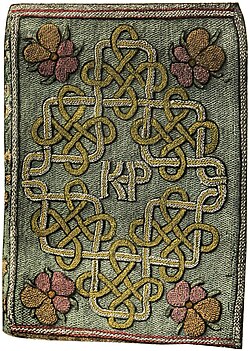| The examples and perspective in this article deal primarily with Western culture and do not represent a worldwide view of the subject. You may improve this article, discuss the issue on the talk page, or create a new article, as appropriate. (March 2022) (Learn how and when to remove this message) |

Needlework is decorative sewing and textile arts handicrafts. Anything that uses a needle for construction can be called needlework. Needlework may include related textile crafts such as crochet, worked with a hook, or tatting, worked with a shuttle.
Similar abilities often transfer well between different varieties of needlework, such as fine motor skill and knowledge of textile fibers. Some of the same tools may be used in several different varieties of needlework.
Background

Needlework was an important fact of women's identity during the Victorian age, including embroidery, netting, knitting, crochet, and Berlin wool work. A growing middle class had more leisure time than ever before; printed materials offered homemakers thousands of patterns. Women were still limited to roles in the household, and under the standards of the time a woman working on needle work while entertaining the parlor was considered beautiful. According to one publication from 1843: "Never is beauty and feminine grace so attractive as, when engaged in the honorable discharge of household duties, and domestic cares."
Fancy work was distinguished from plain sewing and it was a mark of a prosperous and well-managed home to display handmade needlework. While plain sewing was often handed over to servants, even in middle class households, fancy work would often be done while entertaining guests, in the afternoons, evenings, or on Sundays. The types of goods that could be decorated with needlework techniques was limited only by the imagination: knitted boots, embroidered book covers, footstools, lampshades, sofa cushions, fans and on and on.
Types
- Appliqué
- Bead weaving: loom and off-loom
- Braiding and tassel making
- Crochet
- Embroidery
- Knitting
- Lace-making/Needle lace
- Lucet
- Macramé
- Needlepoint
- Quilting
- Sewing
- Tapestry
- Tatting
See also
References
- "Needlework". The Free Dictionary By Farlex. Retrieved 2012-05-23.
- ^ Ledbetter, Kathryn (2012). Victorian Needlework.
External links
- Art in Needlework: A Book about Embroidery by Mary Buckle and Lewis F. Day, available through Project Gutenberg
- Beeton's Book of Needlework by Isabella Mary Beeton, available through Project Gutenberg
- Encyclopedia of Needlework by Therese de Dillmont, available through Project Gutenberg
| Textile arts | ||
|---|---|---|
| Fundamentals |  | |
| History of ... | ||
| Regional and ethnic | ||
| Related | ||
| Glossaries | ||
| Embroidery | ||
|---|---|---|
| Styles |    | |
| Stitches | ||
| Tools and materials | ||
| Regionaland historical | ||
| Embroideries |
| |
| Designersand embroiderers |
| |
| Organizationsand museums | ||
| Related | ||